【新课标】 Unit 12 Life is full of the unexpected. 整单元知识点解析课件(共60张ppt)
文档属性
| 名称 | 【新课标】 Unit 12 Life is full of the unexpected. 整单元知识点解析课件(共60张ppt) |
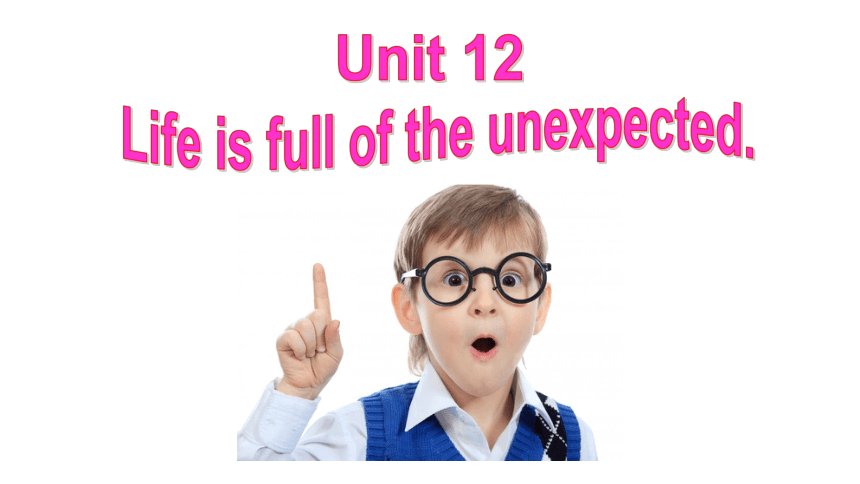
|
|
| 格式 | zip | ||
| 文件大小 | 1.0MB | ||
| 资源类型 | 试卷 | ||
| 版本资源 | 人教新目标(Go for it)版 | ||
| 科目 | 英语 | ||
| 更新时间 | 2023-02-19 00:00:00 | ||
图片预览

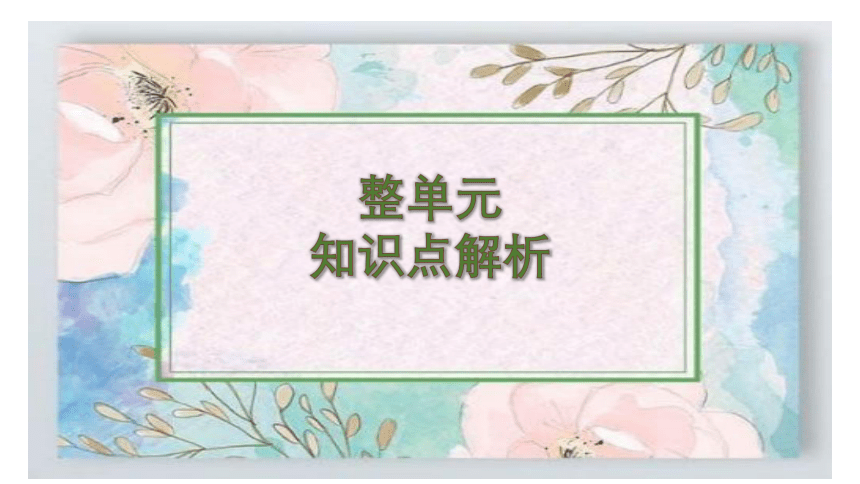
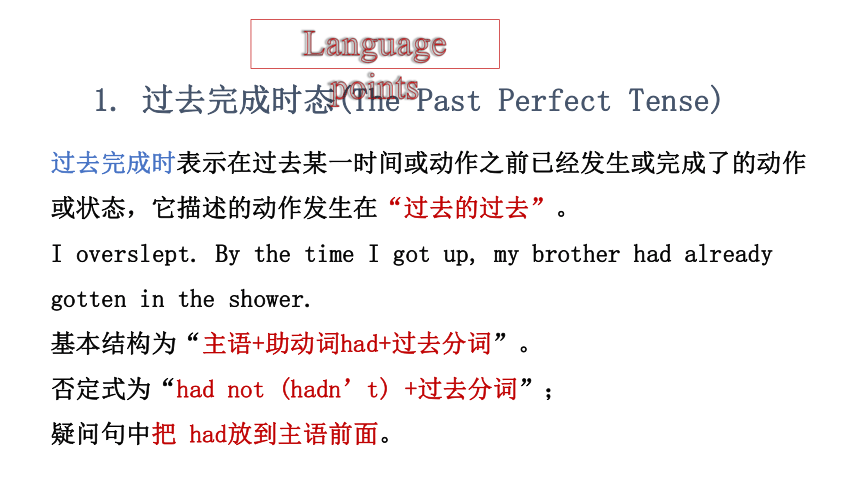
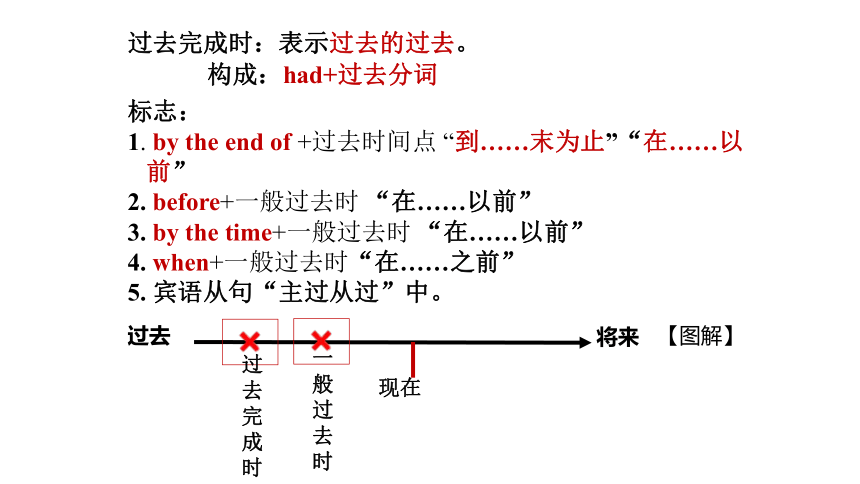
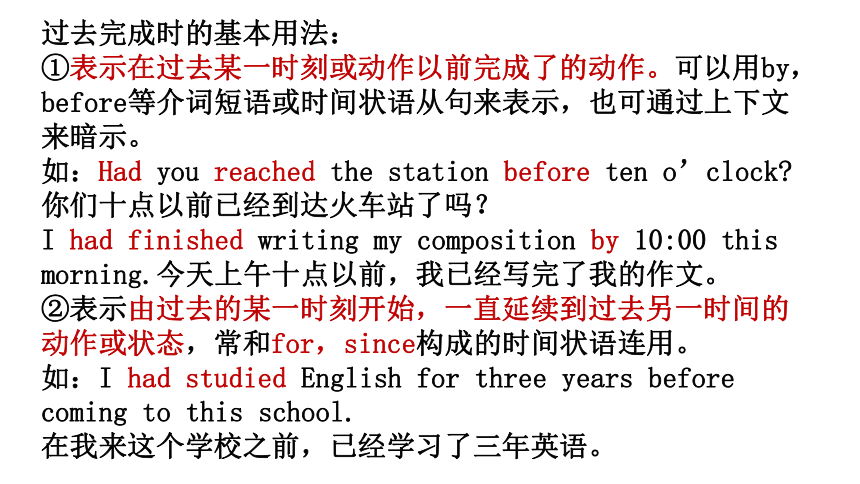
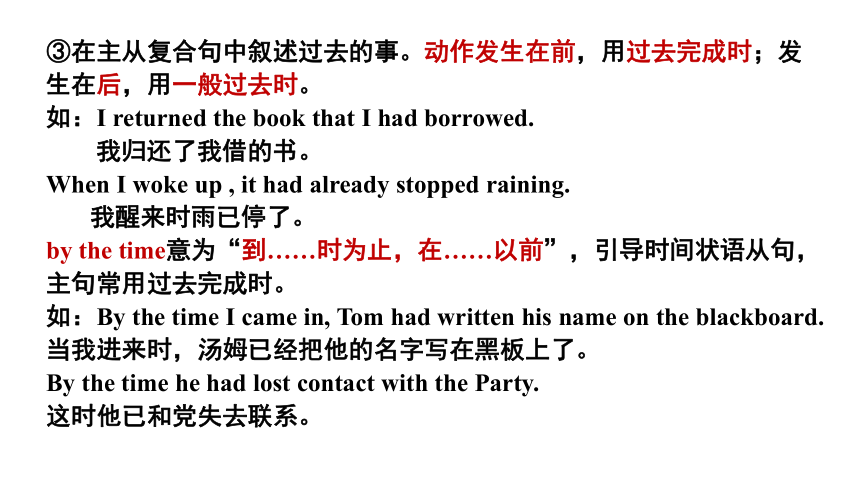
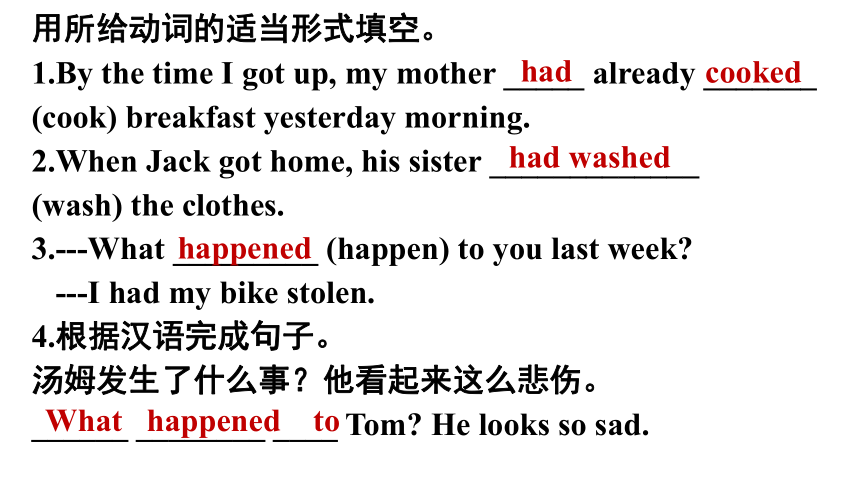
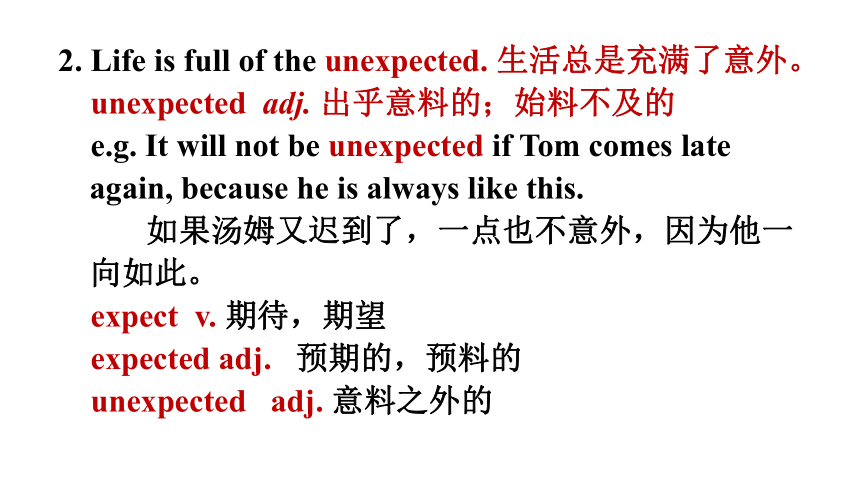
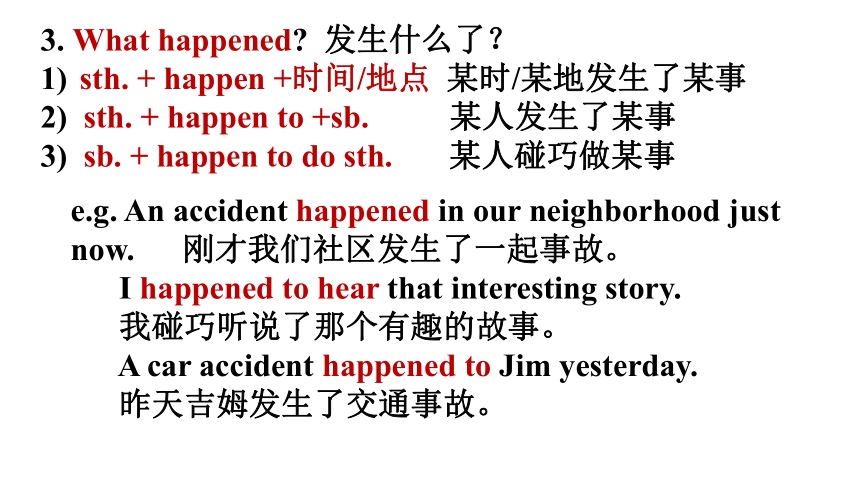
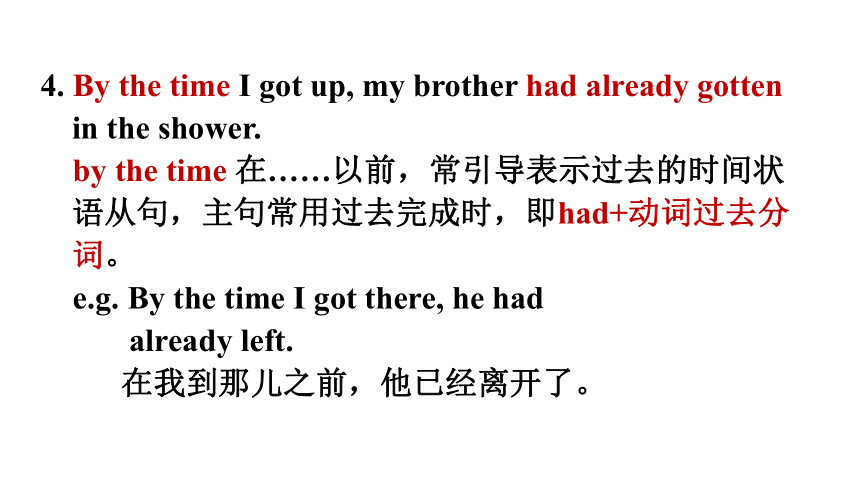
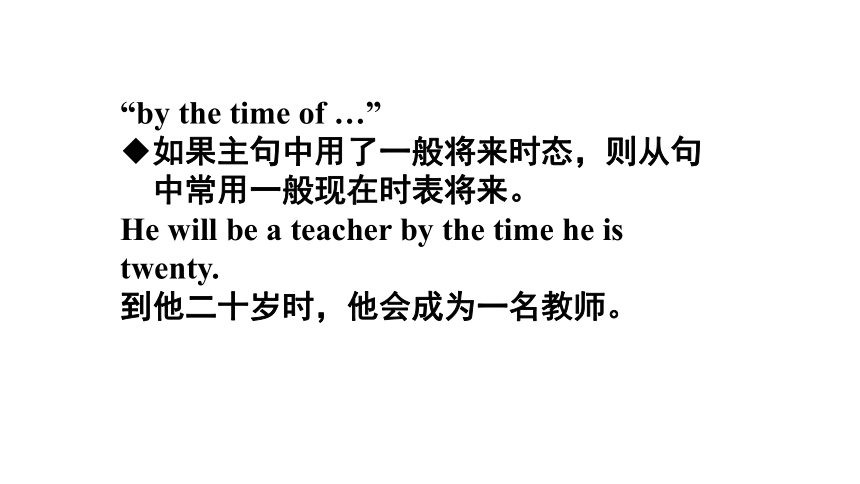
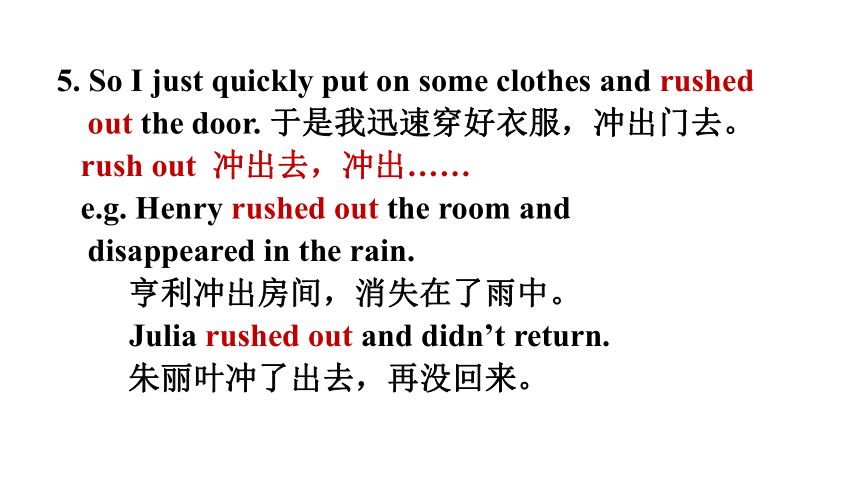
文档简介
(共60张PPT)
Unit 12
Life is full of the unexpected.
整单元
知识点解析
过去完成时表示在过去某一时间或动作之前已经发生或完成了的动作或状态,它描述的动作发生在“过去的过去”。
I overslept. By the time I got up, my brother had already gotten in the shower.
基本结构为“主语+助动词had+过去分词”。
否定式为“had not (hadn’t) +过去分词”;
疑问句中把 had放到主语前面。
1. 过去完成时态(The Past Perfect Tense)
Language points
现在
将来
过去
一
般
过
去
时
过
去
完
成
时
过去完成时:表示过去的过去。
标志:
1. by the end of +过去时间点 “到……末为止”“在……以
前”
2. before+一般过去时 “在……以前”
3. by the time+一般过去时 “在……以前”
4. when+一般过去时“在……之前”
5. 宾语从句“主过从过”中。
构成:had+过去分词
【图解】
过去完成时的基本用法:
①表示在过去某一时刻或动作以前完成了的动作。可以用by,before等介词短语或时间状语从句来表示,也可通过上下文来暗示。
如:Had you reached the station before ten o’clock 你们十点以前已经到达火车站了吗?
I had finished writing my composition by 10:00 this morning.今天上午十点以前,我已经写完了我的作文。
②表示由过去的某一时刻开始,一直延续到过去另一时间的动作或状态,常和for,since构成的时间状语连用。
如:I had studied English for three years before coming to this school.
在我来这个学校之前,已经学习了三年英语。
③在主从复合句中叙述过去的事。动作发生在前,用过去完成时;发生在后,用一般过去时。
如:I returned the book that I had borrowed.
我归还了我借的书。
When I woke up , it had already stopped raining.
我醒来时雨已停了。
by the time意为“到……时为止,在……以前”,引导时间状语从句,主句常用过去完成时。
如:By the time I came in, Tom had written his name on the blackboard.
当我进来时,汤姆已经把他的名字写在黑板上了。
By the time he had lost contact with the Party.
这时他已和党失去联系。
用所给动词的适当形式填空。
1.By the time I got up, my mother _____ already _______ (cook) breakfast yesterday morning.
2.When Jack got home, his sister _____________
(wash) the clothes.
3.---What _________ (happen) to you last week
---I had my bike stolen.
4.根据汉语完成句子。
汤姆发生了什么事?他看起来这么悲伤。
______ ________ ____ Tom He looks so sad.
cooked
had washed
happened
had
What happened to
2. Life is full of the unexpected. 生活总是充满了意外。
unexpected adj. 出乎意料的;始料不及的
e.g. It will not be unexpected if Tom comes late again, because he is always like this.
如果汤姆又迟到了,一点也不意外,因为他一向如此。
expect v. 期待,期望
expected adj. 预期的,预料的
unexpected adj. 意料之外的
3. What happened 发生什么了?
sth. + happen +时间/地点 某时/某地发生了某事
2) sth. + happen to +sb. 某人发生了某事
3) sb. + happen to do sth. 某人碰巧做某事
e.g. An accident happened in our neighborhood just now. 刚才我们社区发生了一起事故。
I happened to hear that interesting story.
我碰巧听说了那个有趣的故事。
A car accident happened to Jim yesterday.
昨天吉姆发生了交通事故。
4. By the time I got up, my brother had already gotten in the shower.
by the time 在……以前,常引导表示过去的时间状语从句,主句常用过去完成时,即had+动词过去分词。
e.g. By the time I got there, he had
already left.
在我到那儿之前,他已经离开了。
“by the time of …”
如果主句中用了一般将来时态,则从句中常用一般现在时表将来。
He will be a teacher by the time he is twenty.
到他二十岁时,他会成为一名教师。
5. So I just quickly put on some clothes and rushed out the door. 于是我迅速穿好衣服,冲出门去。
rush out 冲出去,冲出……
e.g. Henry rushed out the room and disappeared in the rain.
亨利冲出房间,消失在了雨中。
Julia rushed out and didn’t return.
朱丽叶冲了出去,再没回来。
6. Luckily, Carl’s dad saw me on the street and gave me a lift in his car. 很幸运,卡尔的爸爸在街上看见我让我搭了他的车。
gave … a lift 捎……一程
e.g. Could you give me a lift, please
请问你能否捎我一程?
Jim gave me a lift on my way home yesterday.
吉姆昨天在我回家的路上捎了我一程。
1. I was about to go up when I decided to get a coffee first.
在我即将上去时, 我决定先喝杯咖啡。
be about to do sth. 正要 / 马上就要做某事
表达即将发生的事情
be about to do sth. when ... 正要 / 马上就要做某事,这时……
Language points
1) One of my friends is about to go abroad .
我的一个朋友马上就要出国了。
2) I was about to leave when Mark arrived.
马克到的时候我刚要走。
下列几种结构也可以表达一般将来时态:
be going to do sth.
will/shall + do sth.
be (am, is, are) + doing sth.
be to do sth.
e.g. We’re going to have a picnic this weekend.
本周末我们打算进行一次野餐。
He is leaving for Chengdu in two days.
他两天后会前往成都。
2. I went to my favorite coffee place even though it was two blocks east from my office.
even though “即使, 虽然, 尽管”, 用于引导让步状语从句
1) He’s the best teacher, even though he has the least experience.
他虽然经验最少,却是最好的老师。
2) Even though I'm not together with my friends, we keep in touch with one another.
尽管我和朋友不在一起,但我们仍然保持联系。
even if “即使, 虽然, 尽管”, 也用于引导让步状语从句,但主要是一种假设的情况。
Even if we fail this time, we will be successful next time. 即使这次我们失败了,我们下次一定会成功。
even though 表达的情况是真实的。
Even though he didn’t say anything, we could see he was angry.
尽管他什么也没说,但我们看得出他很生气。
block n. 街区, 积木,堵塞物
vt. 封锁,堵塞,妨碍
v. 思维中断,感知阻隔
1) The museum is just six blocks away.
博物馆离这儿只有六条街。
2) My friend and I live on the same block.
我和我的朋友住在同一个街区。
3. We stared in disbelief at the black smoke rising above the burning building.
我们直愣愣地盯着燃烧的大楼上升起的黑烟,无法相信(这一切)。
stare v. (目不转睛地)盯着看, 凝视
stare at sb. / sth. 盯着某人/某事看
e.g. What are you staring at
你眼睛一动不动地在盯着看什么呢?
Don’t stare at people like that. It’s rude.
别那样盯着人看,这不礼貌。
disbelief n. 不信;怀疑
dis (否定前缀) + belief
in disbelief 不相信,怀疑,疑惑 (通常在句中作状语)
用来表示人们持有怀疑、疑虑的态度,常与stare at somebody, shake one’s head等搭配使用。
e.g. I stared at him in disbelief, shocked at what he had said.
我直盯着他,十分震惊,不相信他说的一切。
My grandmother shook her head in disbelief.
我奶奶摇着头,丝毫不信。
above prep.
1)(表示位置)在……上面;高于(与 below相对)
e.g. He lifted his hands above his head.
他将双手举过头顶。
2) 表示地位、级别、能力、重要性等方面“超过”、“在……之上”、“比……强”。
e.g. He is above the others in ability.
他的能力优于其他人。
He is above me in every way.
他各个方面都比我强。
3) above adv. 在上面
e.g. There are snowy peaks above.
上面是白雪皑皑的群峰。
See the examples given above.
见上述例子。
词条 意思 图示 对应词
on 常指一个物体在另一个物体的表面上,两个物体相互接触 \
over 常表示一个物体在另一个物体的垂直上方,两个物体相互不接触 under
above 常笼统地表示一个物体高于另一个物体 below
on, over, above
e.g. Leave your things on the table over there.
There is a light hanging over the desk.
We were flying above the clouds.
【语境应用】根据句意选用above,on或over填空。
1) There is a bridge ________ the river.
2) There is a ball ________ the floor.
3) The mountain is 1,000 feet ________ sea level (海平面).
4) The sun is shining ________.
5) Please write to us at the ________ address.
over
on
above
above
above
burn v. 着火,燃烧
(burnt, burnt / burned, burned)
burning adj. 着火的;燃烧的 burned adj. 烧过了的
沙子这么烫!会烫伤脚的。
The sand is so hot! It can burn my feet.
他被困在正在燃烧的房屋里。
He was trapped in a burning house.
We saw a burned big tree in the village.我们在村子里看到一座烧焦的大树。
4. I felt lucky to be alive.
alive adj. 活着的;有生气的, 在句中可作表语、后置定语或宾语补足语。 反义词是dead。
注意:表示“有生气的”意思时,通常不用very修饰, 但可用much或very much修饰。
e.g. He is the only person alive in the fire.
他是那场火灾中唯一活下来的人。
It was the kind of morning when you wake up and feel really alive. 这是一个醒来觉得充满活力的早晨。
alive, lively, living, live
单词 词性 意思 用法及举例
alive adj. 在世的,有生气的 作表语或后置定语。如:
keep/stay alive活着
lively adj. 有生气的,生机勃勃的 作表语和定语,可作前置定语。如:a lively child
living n. 生计 make/earn a living 谋生
adj. 活着的,活的 可作表语、前置定语
living things 生物
单词 词性 意思 用法及举例
live v. 生活,居住 live in someplace
居住在某处
adj. 活的 live animals活的动物
adj. & adv. 现场直播 a live radio show
现场直播节目
用live的适当形式填空。
1) A lot of the bars have ______ music .
2) They have ______ in Holland for ten years.
3) It was a bad accident – they’re lucky to be _______.
4) The whole house was ______ with activity.
5) He’s one of the greatest _______ composers (作曲家).
6) Josephine was bright, ______ and cheerful.
live
lived
alive
alive
living
lively
5. But by the time I got to the airport, my plane to New Zealand had already taken off. 但是当我到达机场时,我飞往新西兰的航班已经起飞了。
take off 脱掉; 起飞
1) We eventually took off at 11 o’clock and arrived in Venice at 1:30.
我们终于在11点起飞,1:30 到达威尼斯。
2)He took off his hat and bowed as he passed.
他经过时脱帽鞠躬。
【拓展】turn相关短语
turn
left/right= turn to the left/right
on ___________
off ___________
up ________________
down ______________
out ____________
out (to be) ______________
over ___________________
to ___________________
打开
关闭
调高(音量);出现
调低(音量);拒绝
生产,制造
证明是,结果是
翻转;深思熟虑
翻到,转向
Complete the sentences.
1. 我在动物园里见过活鳄鱼。
I have seen a _____ crocodile in the zoo.
2. 他是那场火灾中唯一活下来的人。
He is the only person ____ in the fire.
3. 露西是个活泼的孩子,大家都喜欢她。
Lucy is a _____ child and everyone likes her.
living
alive
lively
4. The boy ____________________ (正要开始) but someone spoke first.
5. Hurry up. The train ______________ (马上就要开了).
was just about to begin
is about to start
Language points
Before she got a chance to say goodbye, he had gone into the building. 在她还没来得及告别之前,他已经进入了那栋楼。
get a chance 找到机会
say goodbye to 向某人告别
say hi/hello to 向某人问好
say sorry to 向某人道歉
1. Dave, Nick and Joe are talking about April Fool’s Day.
fool n. 傻瓜;愚人;受骗者
vt. 愚弄,欺骗;
e.g. He was fooled by his friend on April Fool’s Day. 愚人节那天他被他的朋友愚弄了。
Don’t cheat him. He is not a fool. 不要骗他,他不傻。
Language points
【拓展】
foolish adj. 愚蠢的;傻的
April Fool’s Day 愚人节
make a fool of 愚弄……
e.g. She’s just a vain, foolish woman.
她不过是个愚蠢虚荣的女人。
Who does she think she is Trying to make a fool of me like that.
她以为她是谁啊?竟敢那样愚弄我。
2. Dave was really embarrassed.
embarrassed adj. 局促不安的;为难的;尴尬的;窘迫的
embarrassing adj. 使人尴尬的,令人为难的
e.g. He looked a bit ____________.
他看起来有点尴尬。
That was an _____________ situation for me.
那种情形让我难堪。
embarrassed
embarrassing
3. …when my alarm went off, I got up, took a shower, got dressed, and went to school.
get dressed 穿上衣服
e.g. Go and get dressed! 去把衣服穿好!
【拓展】get dressed, be dressed
get dressed 穿的动作;
be dressed 穿的状态,后常接in。
e.g. He is getting dressed. 他正在穿衣服。
dress n. 连衣裙,礼服
v. 穿衣服,后面接人做宾语。
put on v. 意思是“穿”,表示穿的动作。
wear v. 意思是“穿着”, 表示穿的状态。
in + 颜色。表示穿着什么颜色的衣服。
The dress on you is so beautiful. 这件衣服穿在你身上真好看。
He is putting on a hat. 他正在戴帽子。
She often wears a red scarf. 她常常系着一条红围巾。
【拓展】
4. The other kids showed up.
show up 露面,到场;(使)看得见, 相当于appear。
e.g. We waited until five o’clock, but he did not show up.
我们一直等到了5点,但是他始终没有露面。
e.g. Look at the twins. One is thin, the other is heavy.
看这对双胞胎,一个瘦,另一个胖。
the other, another, other, others, the others
the other 特指两者中的另一个。one... the other... 一个……另一个……
another 泛指三者或三者以上中的另一个,后接单数名词。
other 泛指别的;其他的。后常接复数名词或不可数名词。
others 泛指其他的人或物, 后不接名词。some... others... 一些……另一些……
the others 特指某一范围内的另外的人或物。some... the others... 一些……其余的……
单项选择。
—Can you kick the ball to ________ end of the football field
—It’s hard for me. I think few goalkeepers can make it.
A. another B. the other C. other
B
5. I was tired because I had stayed up all night studying.
stay up 熬夜
e.g. It’s bad for us to stay up late.
熬夜很晚对我们来说有害。
stay away from… 远离…
stay + adj. 保持…状态
单项选择。
—You seem tired. What’s wrong
—I _______ to study for my English test last night.
A. picked up B. woke up
C. cheered up D. stayed up
D
April Fool’s Day is a celebration that takes place in different countries around the world.
愚人节是一个世界上许多不同国家都会庆祝的节日。
Language points
fool n. 傻瓜;愚人;受骗者
vt. 愚弄,欺骗; 。
1) People always think I’m a fool.
人们总认为我是个傻瓜。
2) He was fooled by his friend on April Fool’s Day.
愚人节那天他被他的朋友愚弄了。
take place 发生;进行;举行;产生(有预谋的)
happen v. 发生,碰巧(偶然的)
e.g. Many changes have taken place in my hometown these years.
这些年我的家乡发生了很大的变化。
The car accident happened on a rainy day.
那次交通事故发生在一个雨天。
词条 意思 例句
take place 事先计划或预料到的事情发生;举行 The next meeting will take place on Thursday.
happen 偶然或出乎意料发生的事情 It’s impossible to predict (预测) what will happen next.
come about 发生;产生,事情已发生,不知原因,疑问句或否定句 Can you tell me how the thing came about
break out 突然发生;爆发。战争、灾难、疾病或争吵 World War Ⅱ broke out in 1939.
come about, happen, take place, break out
【语境应用】完成句子。
1) Look at your clothes. What _____________ to you on your way here
2) Everyone in our school doesn’t know how the thing _____________.
3) Great changes have _____________ in the small city since I came here.
4) The flu usually _____________ in spring.
happened
came about
taken place
breaks out
2. ..., all the spaghetti across the country had been sold out.
sell out 卖完;售完;出售
on sale 出售,打折销售
1) The next day the bookshops sold out.
第二天书店就卖断了货。
2) Football games often sell out well in advance.
足球比赛的门票常常提前销售一空。
3. …a reporter in England announced that there would be no more spaghetti because…
英国的一位记者宣称,……以后将不再有意大利面条了。
no more 不再。常放在be动词、助动词、情态动词之后,实义动词之前。=not...any more。
e.g. He no more lives here.
=He doesn’t live here any more. (翻译)
他不再在这里居住了。
4. … a TV show reported the discovery of a special water. 一个电视节目报道说发现了一种特殊的水。
discovery n. 发现,发觉;(剧情的)
发展;被发现的事物
discover v. 发现
e.g. He knows that he had made a real discovery.
他知道他已经发现了一件真正的珍品。
Who first discovered the truth that the earth goes round the sun
是谁第一个发现了地球绕着太阳转?
5. Many April Fool’s jokes may end up being not very funny.
许多愚人节玩笑的结局并不那么有趣。
end up (doing sth.) 以……结束;最终成为;最后处于
e.g. Every time she tried to argue with her husband, she ended up crying her eyes out.
每次她试着和她丈夫争辩,她总是以流泪结束。
end up sth. 结束某事
end up with sth. 以……结束
e.g. The scientist ended up his speech at last.
The students began with speaking English, but ended up with speaking Chinese. (翻译)
那个科学家最后结束了演讲。
同学们以说英语开始,却以说汉语结束。
【拓展】
【语境应用】完成句子。
1) 记者刚刚结束了他的报道。
The reporter has just __________________.
2) 聚会以一曲舞蹈结束。
The party ______________ a dance.
3) 他们做了很多工作,结果什么也没得到。
They did much work, but they _______________ nothing.
ended up his report
ended up with
ended up getting
marry v. “嫁,娶,结婚”
e.g. Henry didn’t marry until he was over fifty.
亨利直到过了50岁才结婚。
(1) marry sb. 表示“嫁给某人”、“娶了某
人”或“和某人结婚”
(2) get/be married to sb.
e.g. John is going to marry Jane.
约翰要和简结婚了。
6. The lady was so happy because she really wanted to get married. 这个女士非常高兴,因为她真的想要
7. One of the world’s most famous tricks, however, happened in October rather than in April.
然而,世界上最出名的恶作剧之一却发生在十月而不是四月。
rather than 而不是。常连接两个并列的成分。
e.g. Molly likes rice rather than noodles.
To our surprise, the rich man goes to work on foot rather than by car.
【拓展】
rather than与prefer to 连用时:prefer to do sth. rather than do/doing/to do sth. 宁愿做某事而不愿做某事,与would rather do sth. than do sth.结构同义。
e.g. The weather is cold. Susan prefers to stay at home rather than travel/traveling/to travel.
= The weather is cold. Susan would rather stay at home than travel.
【语境应用】翻译句子。
1) Ann依赖于她爸爸而不是她妈妈。
2) 今天下午我们去游泳而不是去购物。
3) Kevin宁愿步行去那儿而不愿坐公交车去。
Ann depends on her father rather than her mother.
We will go swimming rather than go shopping this afternoon.
Kevin prefers to walk there rather than go/going/to go there by bus. /
Kevin would rather walk there than go there by bus.
embarrassed adj. 局促不安的;为难的;
尴尬的;窘迫的
e.g. He looked a bit embarrassed.
他看起来有点尴尬。
embarrassing adj. 使人尴尬的,令人为难的
e.g. That was an embarrassing situation for me.
那种情形让我难堪。
Language points
The unexpected is sometimes a chance.
Unit 12
Life is full of the unexpected.
整单元
知识点解析
过去完成时表示在过去某一时间或动作之前已经发生或完成了的动作或状态,它描述的动作发生在“过去的过去”。
I overslept. By the time I got up, my brother had already gotten in the shower.
基本结构为“主语+助动词had+过去分词”。
否定式为“had not (hadn’t) +过去分词”;
疑问句中把 had放到主语前面。
1. 过去完成时态(The Past Perfect Tense)
Language points
现在
将来
过去
一
般
过
去
时
过
去
完
成
时
过去完成时:表示过去的过去。
标志:
1. by the end of +过去时间点 “到……末为止”“在……以
前”
2. before+一般过去时 “在……以前”
3. by the time+一般过去时 “在……以前”
4. when+一般过去时“在……之前”
5. 宾语从句“主过从过”中。
构成:had+过去分词
【图解】
过去完成时的基本用法:
①表示在过去某一时刻或动作以前完成了的动作。可以用by,before等介词短语或时间状语从句来表示,也可通过上下文来暗示。
如:Had you reached the station before ten o’clock 你们十点以前已经到达火车站了吗?
I had finished writing my composition by 10:00 this morning.今天上午十点以前,我已经写完了我的作文。
②表示由过去的某一时刻开始,一直延续到过去另一时间的动作或状态,常和for,since构成的时间状语连用。
如:I had studied English for three years before coming to this school.
在我来这个学校之前,已经学习了三年英语。
③在主从复合句中叙述过去的事。动作发生在前,用过去完成时;发生在后,用一般过去时。
如:I returned the book that I had borrowed.
我归还了我借的书。
When I woke up , it had already stopped raining.
我醒来时雨已停了。
by the time意为“到……时为止,在……以前”,引导时间状语从句,主句常用过去完成时。
如:By the time I came in, Tom had written his name on the blackboard.
当我进来时,汤姆已经把他的名字写在黑板上了。
By the time he had lost contact with the Party.
这时他已和党失去联系。
用所给动词的适当形式填空。
1.By the time I got up, my mother _____ already _______ (cook) breakfast yesterday morning.
2.When Jack got home, his sister _____________
(wash) the clothes.
3.---What _________ (happen) to you last week
---I had my bike stolen.
4.根据汉语完成句子。
汤姆发生了什么事?他看起来这么悲伤。
______ ________ ____ Tom He looks so sad.
cooked
had washed
happened
had
What happened to
2. Life is full of the unexpected. 生活总是充满了意外。
unexpected adj. 出乎意料的;始料不及的
e.g. It will not be unexpected if Tom comes late again, because he is always like this.
如果汤姆又迟到了,一点也不意外,因为他一向如此。
expect v. 期待,期望
expected adj. 预期的,预料的
unexpected adj. 意料之外的
3. What happened 发生什么了?
sth. + happen +时间/地点 某时/某地发生了某事
2) sth. + happen to +sb. 某人发生了某事
3) sb. + happen to do sth. 某人碰巧做某事
e.g. An accident happened in our neighborhood just now. 刚才我们社区发生了一起事故。
I happened to hear that interesting story.
我碰巧听说了那个有趣的故事。
A car accident happened to Jim yesterday.
昨天吉姆发生了交通事故。
4. By the time I got up, my brother had already gotten in the shower.
by the time 在……以前,常引导表示过去的时间状语从句,主句常用过去完成时,即had+动词过去分词。
e.g. By the time I got there, he had
already left.
在我到那儿之前,他已经离开了。
“by the time of …”
如果主句中用了一般将来时态,则从句中常用一般现在时表将来。
He will be a teacher by the time he is twenty.
到他二十岁时,他会成为一名教师。
5. So I just quickly put on some clothes and rushed out the door. 于是我迅速穿好衣服,冲出门去。
rush out 冲出去,冲出……
e.g. Henry rushed out the room and disappeared in the rain.
亨利冲出房间,消失在了雨中。
Julia rushed out and didn’t return.
朱丽叶冲了出去,再没回来。
6. Luckily, Carl’s dad saw me on the street and gave me a lift in his car. 很幸运,卡尔的爸爸在街上看见我让我搭了他的车。
gave … a lift 捎……一程
e.g. Could you give me a lift, please
请问你能否捎我一程?
Jim gave me a lift on my way home yesterday.
吉姆昨天在我回家的路上捎了我一程。
1. I was about to go up when I decided to get a coffee first.
在我即将上去时, 我决定先喝杯咖啡。
be about to do sth. 正要 / 马上就要做某事
表达即将发生的事情
be about to do sth. when ... 正要 / 马上就要做某事,这时……
Language points
1) One of my friends is about to go abroad .
我的一个朋友马上就要出国了。
2) I was about to leave when Mark arrived.
马克到的时候我刚要走。
下列几种结构也可以表达一般将来时态:
be going to do sth.
will/shall + do sth.
be (am, is, are) + doing sth.
be to do sth.
e.g. We’re going to have a picnic this weekend.
本周末我们打算进行一次野餐。
He is leaving for Chengdu in two days.
他两天后会前往成都。
2. I went to my favorite coffee place even though it was two blocks east from my office.
even though “即使, 虽然, 尽管”, 用于引导让步状语从句
1) He’s the best teacher, even though he has the least experience.
他虽然经验最少,却是最好的老师。
2) Even though I'm not together with my friends, we keep in touch with one another.
尽管我和朋友不在一起,但我们仍然保持联系。
even if “即使, 虽然, 尽管”, 也用于引导让步状语从句,但主要是一种假设的情况。
Even if we fail this time, we will be successful next time. 即使这次我们失败了,我们下次一定会成功。
even though 表达的情况是真实的。
Even though he didn’t say anything, we could see he was angry.
尽管他什么也没说,但我们看得出他很生气。
block n. 街区, 积木,堵塞物
vt. 封锁,堵塞,妨碍
v. 思维中断,感知阻隔
1) The museum is just six blocks away.
博物馆离这儿只有六条街。
2) My friend and I live on the same block.
我和我的朋友住在同一个街区。
3. We stared in disbelief at the black smoke rising above the burning building.
我们直愣愣地盯着燃烧的大楼上升起的黑烟,无法相信(这一切)。
stare v. (目不转睛地)盯着看, 凝视
stare at sb. / sth. 盯着某人/某事看
e.g. What are you staring at
你眼睛一动不动地在盯着看什么呢?
Don’t stare at people like that. It’s rude.
别那样盯着人看,这不礼貌。
disbelief n. 不信;怀疑
dis (否定前缀) + belief
in disbelief 不相信,怀疑,疑惑 (通常在句中作状语)
用来表示人们持有怀疑、疑虑的态度,常与stare at somebody, shake one’s head等搭配使用。
e.g. I stared at him in disbelief, shocked at what he had said.
我直盯着他,十分震惊,不相信他说的一切。
My grandmother shook her head in disbelief.
我奶奶摇着头,丝毫不信。
above prep.
1)(表示位置)在……上面;高于(与 below相对)
e.g. He lifted his hands above his head.
他将双手举过头顶。
2) 表示地位、级别、能力、重要性等方面“超过”、“在……之上”、“比……强”。
e.g. He is above the others in ability.
他的能力优于其他人。
He is above me in every way.
他各个方面都比我强。
3) above adv. 在上面
e.g. There are snowy peaks above.
上面是白雪皑皑的群峰。
See the examples given above.
见上述例子。
词条 意思 图示 对应词
on 常指一个物体在另一个物体的表面上,两个物体相互接触 \
over 常表示一个物体在另一个物体的垂直上方,两个物体相互不接触 under
above 常笼统地表示一个物体高于另一个物体 below
on, over, above
e.g. Leave your things on the table over there.
There is a light hanging over the desk.
We were flying above the clouds.
【语境应用】根据句意选用above,on或over填空。
1) There is a bridge ________ the river.
2) There is a ball ________ the floor.
3) The mountain is 1,000 feet ________ sea level (海平面).
4) The sun is shining ________.
5) Please write to us at the ________ address.
over
on
above
above
above
burn v. 着火,燃烧
(burnt, burnt / burned, burned)
burning adj. 着火的;燃烧的 burned adj. 烧过了的
沙子这么烫!会烫伤脚的。
The sand is so hot! It can burn my feet.
他被困在正在燃烧的房屋里。
He was trapped in a burning house.
We saw a burned big tree in the village.我们在村子里看到一座烧焦的大树。
4. I felt lucky to be alive.
alive adj. 活着的;有生气的, 在句中可作表语、后置定语或宾语补足语。 反义词是dead。
注意:表示“有生气的”意思时,通常不用very修饰, 但可用much或very much修饰。
e.g. He is the only person alive in the fire.
他是那场火灾中唯一活下来的人。
It was the kind of morning when you wake up and feel really alive. 这是一个醒来觉得充满活力的早晨。
alive, lively, living, live
单词 词性 意思 用法及举例
alive adj. 在世的,有生气的 作表语或后置定语。如:
keep/stay alive活着
lively adj. 有生气的,生机勃勃的 作表语和定语,可作前置定语。如:a lively child
living n. 生计 make/earn a living 谋生
adj. 活着的,活的 可作表语、前置定语
living things 生物
单词 词性 意思 用法及举例
live v. 生活,居住 live in someplace
居住在某处
adj. 活的 live animals活的动物
adj. & adv. 现场直播 a live radio show
现场直播节目
用live的适当形式填空。
1) A lot of the bars have ______ music .
2) They have ______ in Holland for ten years.
3) It was a bad accident – they’re lucky to be _______.
4) The whole house was ______ with activity.
5) He’s one of the greatest _______ composers (作曲家).
6) Josephine was bright, ______ and cheerful.
live
lived
alive
alive
living
lively
5. But by the time I got to the airport, my plane to New Zealand had already taken off. 但是当我到达机场时,我飞往新西兰的航班已经起飞了。
take off 脱掉; 起飞
1) We eventually took off at 11 o’clock and arrived in Venice at 1:30.
我们终于在11点起飞,1:30 到达威尼斯。
2)He took off his hat and bowed as he passed.
他经过时脱帽鞠躬。
【拓展】turn相关短语
turn
left/right= turn to the left/right
on ___________
off ___________
up ________________
down ______________
out ____________
out (to be) ______________
over ___________________
to ___________________
打开
关闭
调高(音量);出现
调低(音量);拒绝
生产,制造
证明是,结果是
翻转;深思熟虑
翻到,转向
Complete the sentences.
1. 我在动物园里见过活鳄鱼。
I have seen a _____ crocodile in the zoo.
2. 他是那场火灾中唯一活下来的人。
He is the only person ____ in the fire.
3. 露西是个活泼的孩子,大家都喜欢她。
Lucy is a _____ child and everyone likes her.
living
alive
lively
4. The boy ____________________ (正要开始) but someone spoke first.
5. Hurry up. The train ______________ (马上就要开了).
was just about to begin
is about to start
Language points
Before she got a chance to say goodbye, he had gone into the building. 在她还没来得及告别之前,他已经进入了那栋楼。
get a chance 找到机会
say goodbye to 向某人告别
say hi/hello to 向某人问好
say sorry to 向某人道歉
1. Dave, Nick and Joe are talking about April Fool’s Day.
fool n. 傻瓜;愚人;受骗者
vt. 愚弄,欺骗;
e.g. He was fooled by his friend on April Fool’s Day. 愚人节那天他被他的朋友愚弄了。
Don’t cheat him. He is not a fool. 不要骗他,他不傻。
Language points
【拓展】
foolish adj. 愚蠢的;傻的
April Fool’s Day 愚人节
make a fool of 愚弄……
e.g. She’s just a vain, foolish woman.
她不过是个愚蠢虚荣的女人。
Who does she think she is Trying to make a fool of me like that.
她以为她是谁啊?竟敢那样愚弄我。
2. Dave was really embarrassed.
embarrassed adj. 局促不安的;为难的;尴尬的;窘迫的
embarrassing adj. 使人尴尬的,令人为难的
e.g. He looked a bit ____________.
他看起来有点尴尬。
That was an _____________ situation for me.
那种情形让我难堪。
embarrassed
embarrassing
3. …when my alarm went off, I got up, took a shower, got dressed, and went to school.
get dressed 穿上衣服
e.g. Go and get dressed! 去把衣服穿好!
【拓展】get dressed, be dressed
get dressed 穿的动作;
be dressed 穿的状态,后常接in。
e.g. He is getting dressed. 他正在穿衣服。
dress n. 连衣裙,礼服
v. 穿衣服,后面接人做宾语。
put on v. 意思是“穿”,表示穿的动作。
wear v. 意思是“穿着”, 表示穿的状态。
in + 颜色。表示穿着什么颜色的衣服。
The dress on you is so beautiful. 这件衣服穿在你身上真好看。
He is putting on a hat. 他正在戴帽子。
She often wears a red scarf. 她常常系着一条红围巾。
【拓展】
4. The other kids showed up.
show up 露面,到场;(使)看得见, 相当于appear。
e.g. We waited until five o’clock, but he did not show up.
我们一直等到了5点,但是他始终没有露面。
e.g. Look at the twins. One is thin, the other is heavy.
看这对双胞胎,一个瘦,另一个胖。
the other, another, other, others, the others
the other 特指两者中的另一个。one... the other... 一个……另一个……
another 泛指三者或三者以上中的另一个,后接单数名词。
other 泛指别的;其他的。后常接复数名词或不可数名词。
others 泛指其他的人或物, 后不接名词。some... others... 一些……另一些……
the others 特指某一范围内的另外的人或物。some... the others... 一些……其余的……
单项选择。
—Can you kick the ball to ________ end of the football field
—It’s hard for me. I think few goalkeepers can make it.
A. another B. the other C. other
B
5. I was tired because I had stayed up all night studying.
stay up 熬夜
e.g. It’s bad for us to stay up late.
熬夜很晚对我们来说有害。
stay away from… 远离…
stay + adj. 保持…状态
单项选择。
—You seem tired. What’s wrong
—I _______ to study for my English test last night.
A. picked up B. woke up
C. cheered up D. stayed up
D
April Fool’s Day is a celebration that takes place in different countries around the world.
愚人节是一个世界上许多不同国家都会庆祝的节日。
Language points
fool n. 傻瓜;愚人;受骗者
vt. 愚弄,欺骗; 。
1) People always think I’m a fool.
人们总认为我是个傻瓜。
2) He was fooled by his friend on April Fool’s Day.
愚人节那天他被他的朋友愚弄了。
take place 发生;进行;举行;产生(有预谋的)
happen v. 发生,碰巧(偶然的)
e.g. Many changes have taken place in my hometown these years.
这些年我的家乡发生了很大的变化。
The car accident happened on a rainy day.
那次交通事故发生在一个雨天。
词条 意思 例句
take place 事先计划或预料到的事情发生;举行 The next meeting will take place on Thursday.
happen 偶然或出乎意料发生的事情 It’s impossible to predict (预测) what will happen next.
come about 发生;产生,事情已发生,不知原因,疑问句或否定句 Can you tell me how the thing came about
break out 突然发生;爆发。战争、灾难、疾病或争吵 World War Ⅱ broke out in 1939.
come about, happen, take place, break out
【语境应用】完成句子。
1) Look at your clothes. What _____________ to you on your way here
2) Everyone in our school doesn’t know how the thing _____________.
3) Great changes have _____________ in the small city since I came here.
4) The flu usually _____________ in spring.
happened
came about
taken place
breaks out
2. ..., all the spaghetti across the country had been sold out.
sell out 卖完;售完;出售
on sale 出售,打折销售
1) The next day the bookshops sold out.
第二天书店就卖断了货。
2) Football games often sell out well in advance.
足球比赛的门票常常提前销售一空。
3. …a reporter in England announced that there would be no more spaghetti because…
英国的一位记者宣称,……以后将不再有意大利面条了。
no more 不再。常放在be动词、助动词、情态动词之后,实义动词之前。=not...any more。
e.g. He no more lives here.
=He doesn’t live here any more. (翻译)
他不再在这里居住了。
4. … a TV show reported the discovery of a special water. 一个电视节目报道说发现了一种特殊的水。
discovery n. 发现,发觉;(剧情的)
发展;被发现的事物
discover v. 发现
e.g. He knows that he had made a real discovery.
他知道他已经发现了一件真正的珍品。
Who first discovered the truth that the earth goes round the sun
是谁第一个发现了地球绕着太阳转?
5. Many April Fool’s jokes may end up being not very funny.
许多愚人节玩笑的结局并不那么有趣。
end up (doing sth.) 以……结束;最终成为;最后处于
e.g. Every time she tried to argue with her husband, she ended up crying her eyes out.
每次她试着和她丈夫争辩,她总是以流泪结束。
end up sth. 结束某事
end up with sth. 以……结束
e.g. The scientist ended up his speech at last.
The students began with speaking English, but ended up with speaking Chinese. (翻译)
那个科学家最后结束了演讲。
同学们以说英语开始,却以说汉语结束。
【拓展】
【语境应用】完成句子。
1) 记者刚刚结束了他的报道。
The reporter has just __________________.
2) 聚会以一曲舞蹈结束。
The party ______________ a dance.
3) 他们做了很多工作,结果什么也没得到。
They did much work, but they _______________ nothing.
ended up his report
ended up with
ended up getting
marry v. “嫁,娶,结婚”
e.g. Henry didn’t marry until he was over fifty.
亨利直到过了50岁才结婚。
(1) marry sb. 表示“嫁给某人”、“娶了某
人”或“和某人结婚”
(2) get/be married to sb.
e.g. John is going to marry Jane.
约翰要和简结婚了。
6. The lady was so happy because she really wanted to get married. 这个女士非常高兴,因为她真的想要
7. One of the world’s most famous tricks, however, happened in October rather than in April.
然而,世界上最出名的恶作剧之一却发生在十月而不是四月。
rather than 而不是。常连接两个并列的成分。
e.g. Molly likes rice rather than noodles.
To our surprise, the rich man goes to work on foot rather than by car.
【拓展】
rather than与prefer to 连用时:prefer to do sth. rather than do/doing/to do sth. 宁愿做某事而不愿做某事,与would rather do sth. than do sth.结构同义。
e.g. The weather is cold. Susan prefers to stay at home rather than travel/traveling/to travel.
= The weather is cold. Susan would rather stay at home than travel.
【语境应用】翻译句子。
1) Ann依赖于她爸爸而不是她妈妈。
2) 今天下午我们去游泳而不是去购物。
3) Kevin宁愿步行去那儿而不愿坐公交车去。
Ann depends on her father rather than her mother.
We will go swimming rather than go shopping this afternoon.
Kevin prefers to walk there rather than go/going/to go there by bus. /
Kevin would rather walk there than go there by bus.
embarrassed adj. 局促不安的;为难的;
尴尬的;窘迫的
e.g. He looked a bit embarrassed.
他看起来有点尴尬。
embarrassing adj. 使人尴尬的,令人为难的
e.g. That was an embarrassing situation for me.
那种情形让我难堪。
Language points
The unexpected is sometimes a chance.
同课章节目录
- Unit 1 How can we become good learners.
- Section A
- Section B
- Unit 2 I think that mooncakes are delicious!
- Section A
- Section B
- Unit 3 Could you please tell me where the restroom
- Section A
- Section B
- Unit 4 I used to be afraid of the dark.
- Section A
- Section B
- Unit 5 What are the shirts made of?
- Section A
- Section B
- Review of Units 1-5
- Unit 6 When was it invented?
- Section A
- Section B
- Unit 7 Teenagers should be allowed to choose their
- Section A
- Section B
- Unit 8 It must belong to Carla.
- Section A
- Section B
- Unit 9 I like music that I can dance to.
- Section A
- Section B
- Unit 10 You're supposed to shake hands.
- Section A
- Section B
- Review of Units 6-10
- Unit 11 Sad movies make me cry.
- Section A
- Section B
- Unit 12 Life is full of the unexpected
- Section A
- Section B
- Unit 13 We're trying to save the earth!
- Section A
- Section B
- Unit 14 I remember meeting all of you in Grade 7.
- Section A
- Section B
- Review of Units 11-14
